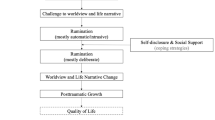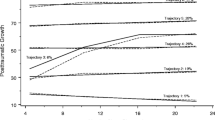Abstract
Introduction
Fear of the future is one of the most stressful aspects of having cancer. Research to date has conceptualized fear of the future as a precursor of distress or stress-response symptoms. Yet it is equally plausible that distress would predict increased fear of the future or that they would have a reciprocal influence on each other. The purpose of the present study was to examine the bidirectional relations between fear of the future and distress as well as intrusion and avoidance among breast cancer survivors at 3, 7, 11, and 15 months after diagnosis.
Methods
We used a bivariate latent difference score model for dynamic change to examine these bidirectional relationships among 146 early-stage breast cancer survivors. Using Lisrel version 8.80, we examined four models testing different hypothesized relationships between fear of the future and distress and intrusion and avoidance.
Results
Based on model fit evaluation, our data shows that decreases in distress over time lead to a reduction of fear of the future but that changes in fear do not lead to changes in distress. On the other hand, there is no relationship between changes in fear of the future and intrusion and avoidance over time.
Discussion
Ongoing fear of the future does not appear to be a necessary condition for the development of stress-response symptoms. Implications for Cancer Survivors: Future studies need to explore the role of distressing emotions in the development and exacerbation of fear of the future among cancer survivors.
Similar content being viewed by others
Notes
We would like to thank the two anonymous reviewers who suggested we clearly define the concepts of fear of the future and fear of cancer recurrence.
For a more detailed description of the relations between fear of the future and sociodemographic factors, please refer to an earlier publication (Lebel et al. 2007).
References
Ferlay J, Bray F, Pisani P, Parkin DM. GLOBOCAN 2002. Cancer incidence, mortality and prevalence worldwide. IARC CancerBase No. 5[2.0]. Lyon: IARC; 2004.
Dunkel-Schetter C, Feinstein LG, Taylor SE, Falke RL. Patterns of coping with cancer. Health Psychology. 1992;11(2):79–87. doi:10.1037/0278-6133.11.2.79.
Lee-Jones C, Humphris G, Dixon R, Hatcher MB. Fear of cancer recurrence-A literature review and proposed cognitive formulation to explain exacerbation of recurrence fears. Psycho-Oncology. 1997;6(2):95–105. doi:10.1002/(SICI) 1099-1611(199706) 6:2<95::AID-PON250>3.0.CO;2-B.
Wong CA, Bramwell L. Uncertainty and anxiety after mastectomy for breast cancer. Cancer Nursing. 1992;15:363–71. doi:10.1097/00002820-199210000-00006.
Vickberg SM. The Concerns About Recurrence Scale (CARS): a systematic measure of women’s fears about the possibility of breast cancer recurrence. Annals of Behavioral Medicine. 2003;25:16–24. doi:10.1207/S15324796ABM2501_03.
Black EK, White CA. Fear of recurrence, sense of coherence and posttraumatic stress disorder in haematological cancer survivors. Psycho-Oncology. 2005;14:510–15. doi:10.1002/pon.894.
Mishel MH, Germino BB, Gil KM, Belyea M, Carlton Laney I, Stewart J, et al. Benefits from an uncertainty management intervention for African-American and Caucasian older long-term breast cancer survivors. Psycho-Oncology. 2005;14:962–78. doi:10.1002/pon.909.
Baker F, Denniston M, Smith T, West MM. Adult cancer survivors: how are they faring? Cancer. 2005;104(S11):2565–76. doi:10.1002/cncr.21488.
Lebel S, Rosberger Z, Edgar L, Devins GM. Comparison of four common stressors across the breast cancer trajectory. Journal of Psychosomatic Research. 2007;63:225–32. doi:10.1016/j.jpsychores.2007.02.002.
Ferrell BR, Grant MM, Funk B, Otis-Green S, Garcia N. Quality of life in breast cancer survivors as identified by focus group. Psycho-Oncology. 1997;6:13–23. doi:10.1002/(SICI) 1099-1611(199703) 6:1<13::AID-PON231>3.0.CO;2-S.
Dow KH, Ferrell BR, Leigh S, Ly J, Gulasekaram P. An evaluation of the quality of life among long-term survivors of breast cancer. Breast Cancer Research and Treatment. 1996;39:261–73. doi:10.1007/BF01806154.
Fleer J, Sleijfer D, Hoekstra H, Tuinman M, Klip E, Hoekstra-Weebers J. Objective and subjective predictors of cancer-related stress symptoms in testicular cancer survivors. Patient Education and Counseling. 2006;64:142–50. doi:10.1016/j.pec.2005.12.009.
Ganz PA, Coscarelli A, Fred C, Kahn B, Polinsky ML, Petersen L. Breast cancer survivors: psychosocial concerns and quality of life. Breast Cancer Research and Treatment. 1996;38(2):183–9. doi:10.1007/BF01806673.
Leake RL, Gurrin LC, Hammond IG. Quality of life in patients attending a low risk gynaecological oncology follow-up clinic. Psycho-Oncology. 2001;10:428–35. doi:10.1002/pon.539.
Polinsky ML. Functional status of long-term breast cancer survivors: demonstrating chronicity. Health & Social Work. 1994;19(3):165–73.
Ferrell BR, Grant M, Funk B, Garcia N, Otis-Green S, Schaffner ML. Quality of life in breast cancer. Cancer Practice. 1996;4(6):331–40.
Deimling GT, Wagner LJ, Bowman KF, Sterns S, Kercher K, Kahana B. Coping among older-adult, long-term cancer survivors. Psycho-Oncology. 2006;15(2):143–59. doi:10.1002/pon.931.
Ehlers A, Clark DM. A cognitive model of posttraumatic stress disorder. Behaviour Research and Therapy. 2000;38(4):319–45. doi:10.1016/S0005-7967(99) 00123-0.
Stanton AL, Danoff-Burg S, Huggins ME. The first year after breast cancer diagnosis: hope and coping strategies as predictors of adjustment. Psycho-Oncology. 2002;11(2):93–102. doi:10.1002/pon.574.
Llewellyn CD, Weinman J, McGurk M, Humphris G. Can we predict which head and neck cancer survivors develop fears of recurrence? Journal of Psychosomatic Research. 2008;65:525–32. doi:10.1016/j.jpsychores.2008.03.014.
Edgar L, Rosberger Z, Collet JP. Lessons learned: outcomes and methodology of a coping skills intervention trial comparing individual and group formats for patients with cancer. International Journal of Psychiatry in Medicine. 2001;31(3):289–304. doi:10.2190/U0P3-5VPV-YXKF-GRG1.
Rosberger Z, Edgar L, Collet JP, Fournier MA. Patterns of coping in women completing treatment for breast cancer: a randomized controlled trial of Nucare, a brief psychoeducation workshop. Journal of Psychosocial Oncology. 2002;20(3):19–37. doi:10.1300/J077v20n03_02.
Lebel S, Rosberger Z, Edgar L, Devins GM. Predicting stress-related problems in long-term breast cancer survivors. J Psychosom Med 2008.
Lazarus RS, Folkman S. Stress, appraisal, and coping. New York: Springer; 1984.
McNair DM, Lorr M, Droppleman LF. EITS manual for the profile of mood states. San Diego: Educational and Industrial Testing Service; 1971.
Horowitz M, Wilner N, Alvarez W. Impact of event scale: a measure of subjective stress. Psychosomatic Medicine. 1979;41:209–218.
Cordova MJ, Andrykowski MA, Redd WH, Kenady DE, McGrath PC, Sloan DA. Frequency and correlates of postraumatic-stress-disorder-like symptoms after treatment for breast cancer. Journal of Consulting and Clinical Psychology. 1995;63(6):981–6. doi:10.1037/0022-006X.63.6.981.
Cordova MJ, Cunningham LLC, Carlson CR, Andrykowski MA. Social constraints, cognitive processing, and adjustment to breast cancer. Journal of Consulting and Clinical Psychology. 2001;69(4):706–11. doi:10.1037/0022-006X.69.4.706.
Ferrer E, Hamagami F, McArdle JJ. Modeling latent growth curves with incomplete data using different types of structural equation modeling and multilevel software. Structural Equation Modeling. 2004;11(3):452–83. doi:10.1207/s15328007sem1103_8.
Ferrer E, McArdle JJ. Alternative structural models for multivariate longitudinal data analyses. Structural Equation Modeling. 2003;10:493–524. doi:10.1207/S15328007SEM1004_1.
McArdle JJ, Hamagami F. Linear dynamic analyses of incomplete longitudinal data. In: Collins L, Sayers A, editors. Methods for the analysis of change. Washington: American Psychological Association; 2001. p. 139–75.
Bentler PM, Bonett DG. Significance tests and goodness-of-fit in the analysis of covariance structures. Psychological Bulletin. 1980;88:588–606. doi:10.1037/0033-2909.88.3.588.
Browne MW, Cudeck R. Alternative ways of assessing model fit. In: Bollen KA, Long JS, editors. Testing structural equation models. Newbury Park: Sage; 1993. p. 136–62.
Hoyle RH, Panter AT. Writing about structural equation models. In: Hoyle RH, editor. Structural equation modeling: concepts, issues, and applications. Thousand Oaks: Sage; 1995. p. 158–76.
Simard S, Savard J. Fear of cancer recurrence inventory: development and initial validation of a multidimensional measure of fear of cancer recurrence. Support Care Canc. 2009;17(3):241–51.
Easterling DV, Leventhal H. Contribution of concrete cognition to emotion: neutral symptoms as elicitors of worry about cancer. The Journal of Applied Psychology. 1989;74(96):787. doi:10.1037/0021-9010.74.5.787.
Humphris GM, Rogers S, McNally D, Lee-Jones C, Brown J, Vaughan D. Fear of recurrence and possible cases of anxiety and depression in orofacial cancer patients. International Journal of Oral and Maxillofacial Surgery. 2003;32:486–91.
Simard S, Savard J, Larochelle M, Fradet Y. Screening and comorbidity of clinical fear of cancer recurrence. Unpublished manuscript.
Wade TD, Nehmy T, Koczwara B. Predicting worries about health after breast cancer surgery. Psycho-Oncol. 2005;14(6):503–9.
Herschbach P, Keller M, Knight L, Brandl T, Huber T, Henrich B, et al. Psychological problems of cancer patients: a cancer distress screening with a cancer-specific questionnaire. British Journal of Cancer. 2004;91(3):504–11. doi:10.1038/sj.bjc.6601986.
Northouse LL. Mastectomy patients and the fear of cancer recrurrence. Cancer Nursing. 1981;4:213–20. doi:10.1097/00002820-198106000-00004.
Mishel MH. Uncertainty in illness. Image: J Nurs Scholarship. 1988;20:225–32. doi:10.1111/j.1547-5069.1988.tb00082.x.
Elphee EE. Understanding the concept of uncertainty in patients with indolent lymphoma. Oncology Nursing Forum. 2008;35(3):449–54. doi:10.1188/08.ONF.449-454.
Mishel MH. Reconceptualization of the uncertainty in illness theory. Image: J Nurs Scholarship. 1990;22:256–62. doi:10.1111/j.1547-5069.1990.tb00225.x.
Andrews L, Shevlin M, Troop N, Joseph S. Multidimensionality of intrusion and avoidance: alternative factor models of the impact of event scale. Pers Indiv Differ. 2004;36:431–46.
McDaid C, Hodges Z, Fayter D, Stirk L, Eastwood A. Increasing participation of cancer patients in randomised controlled trials: a systematic review. Trials. 2006;17(7):16–26.
Langlois F, Ladouceur R. Adaptation of a GAD treatment for hypochondriasis. Cognitive and Behavioral Practice. 2004;11:393–404. doi:10.1016/S1077-7229(04) 80056-7.
Acknowledgments
Thank you to Dwayne Schindler (University of Ottawa) and Emilio Ferrer (University of California, Davis) for their help with the statistical analyses
Author information
Authors and Affiliations
Corresponding author
Rights and permissions
About this article
Cite this article
Lebel, S., Rosberger, Z., Edgar, L. et al. Emotional distress impacts fear of the future among breast cancer survivors not the reverse. J Cancer Surviv 3, 117–127 (2009). https://doi.org/10.1007/s11764-009-0082-5
Received:
Accepted:
Published:
Issue Date:
DOI: https://doi.org/10.1007/s11764-009-0082-5




